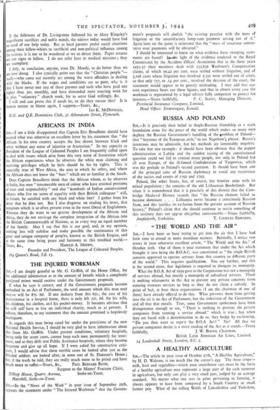THE INJURED WORKMAN
Sia,—I am deeply grateful to Mr. G. Griffith, of the Home Office, for his additional information as to the amount of benefit which a completely paralysed miner would receive tinder the Government proposals.
If what he says is correct, and if the Government proposals become embodied in an Act of Parliament, the total amount which this man may
receive will be 87s. 6d. If one deducts from this 65s., the cost of his maintenance in a hospital home, there is only left 22S. 6d. for his wife, his children, his clothes, an i his pocket-money. It becomes obvious that he will stilli have to live on individual charity, much as at present. I adhere, therefore, to my statement that the amount promised is hopelessly inadequate.
As regards this man being cared for under the provisions of the new
National Health Service, I should be very glad to have information about this from Mr. Griffith. Under present conditions, voluntary hospitals, being only for acute cases, cannot keep such men permanently for treat- ment, and so they drift into Public Assistance hospitals, where they become forgotten and give up all hope. If I were asked for constructive criti- cism, I would advise that these terrible cases be looked after just as the blinded soldiers are looked after, in some sort of St. Dunstan's Home ; for, if the truth be told, they are really much more to be pitied and have much more to suffer.—Yours, PAUL BERNARD ROTH,
Surgeon to the Miners' Fracture Clinic,
Hilltop House, Quarry Avenue, Stoke-on-Trent. Hartshill, Stoke-on-Trent.


























 Previous page
Previous page